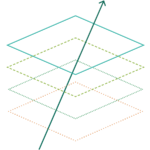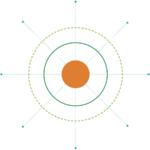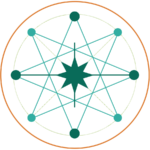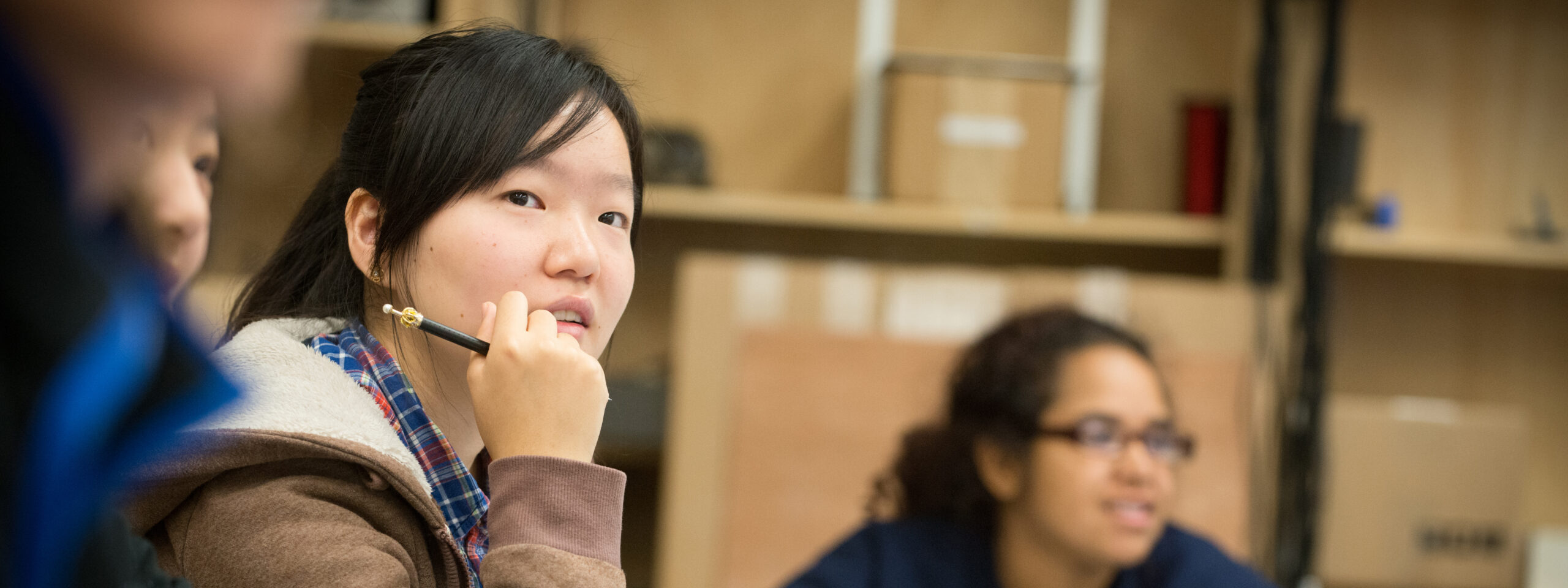The Putney Core outlines the skills, knowledge, and understanding essential to a Putney education and necessary for graduation. A Putney diploma represents four years of planned secondary school study. In addition to successful completion of the baseline requirements outlined by the Putney Core, students will define and pursue other areas of individual interest.
The Putney Core Has Three Components:

I. Throughlines
Seven overarching skills and habits of mind, defined in clear rubrics that guide development through a student’s time at Putney

II. Subject-Centered Objectives
Specific learning objectives define the detail of content and skills that a student will need in each discipline

III. Essential Experiences
Invaluable and immeasurable opportunities to develop qualities which people should progress toward throughout life
I.
Throughlines
The seven Throughlines are overarching skills and habits of mind, supported throughout our curriculum through coursework, projects, activities, jobs, group experiences, and independent studies.
Ethical, Cultural & Social Justice Perspectives
Understands the ethical implications
of questions raised in each discipline. Understands that all fields may be viewed through differing cultural lenses, and appreciates the value of other perspectives. Understands the complexities of social justice.
Inquiry & Research
Turns curiosity into clear, useful questions and pursues a line of inquiry. Practices academic research in the context of different fields.
Argumentation
Constructs arguments, evaluates one’s own arguments and those of others, asks salient questions, and evaluates competing claims in the contexts of different disciplines.
Design & Build
Articulates practical problems, imagines possible solutions, develops plans, attains skills needed to execute plans, and creates objects that address the identified needs.
Collaboration
Works with others in building an intellectual, creative, and active community. Engages in productive dialogue, shows respect to a group, and supports common goals.
Literacy & Communication
Reads, interprets, analyzes, and makes meaning from a multitude of sources including written, visual, and auditory. Effectively conveys meaning in a variety of modes including written, visual, and spoken.
Self-Knowledge & Self-Regulation
Prioritizes, manages time, and understands personal learning styles, strengths and weaknesses; perseveres in the face of adversity and uncertainty.
II.
Subject-Centered Objectives
Each department specifies learning objectives and assesses a student’s progress toward them with rubrics that detail knowledge and skills. Categories of novice, emerging, proficient and beyond help students and teachers use student work as evidence of their learning.
Art
- Analyzes and comprehends art across disciplines using historical and cultural contexts
- Self-evaluates, discusses, and critiques art using appropriate vocabulary
- Demonstrates competence in at least one artistic discipline
- Manifests concepts with 2D, 3D, performance or mixed media
English
- Explores personal identity and diverse perspectives through literature
- Discusses literature with close attention to the text
- Reads and interprets literature
- Crafts imaginative and expository writing
History & Social Science
- Uses history as a tool for understanding across disciplines, cultures, space, and time
- Locates and uses academic resources to interpret, analyze, and construct historical arguments
Mathematics
- Models change using mathematics
- Uses technology and coding to facilitate mathematical work and exploration
- Uses geometric reasoning to model and analyze spatial relations and patterns
- Uses probability and statistics to under- stand and manage variability in data
- Demonstrates financial literacy
Modern Languages
- Listens, reads, speaks, and writes at an intermediate skill level in one non-native language
Science
- Possesses a working knowledge of major biological, chemical, and physical principles
- Designs and implements lab-based inquiries to investigate novel questions
- Describes, analyzes, and reports on a body of evidence generated by scientific investigations
III.
Essential Experiences
There are qualities we wish all Putney graduates to have, which are inherently valuable, and in fact are qualities towards which people should make progress throughout their lives. These qualities include cultural fluency, self-reliance, an appreciation for manual labor, an appreciation of fine arts, and a capacity for the “hard stretching of oneself.” Essential Experiences present invaluable and immeasurable opportunities to develop these qualities. We require that Putney students fulfill all of them in order to graduate.
-
Maintain Reasonable Physical Activity
Participate in an activity at least twice a week that develops aerobic fitness, physical endurance, or physical strength while on The Putney School campus.
The experience of maintaining a reasonable level of physical activity helps students to maintain their physical well-being and affords them opportunities to “play as wholeheartedly as [they] work”. -
Do the Work Necessary to Sustain the School Community
Fulfill the requirements of the Work Program as currently stated.
The experience of engaging in productive labor develops students’ belief in manual labor, and allows students opportunities to be proud of working to support the community within which they are living and to learn important skills such as collaboration, perseverance, and leadership.
-
Camp in the Outdoors for a Minimum of Five Days
Participate in Long Fall trips every year while attending The Putney School. Experience sleeping at least 3 consecutive nights disconnected from media and phone and where one must carry in one’s own supplies.
The experience of camping in a remote location builds a connection with the natural world, develops self-reliance, and can also foster an ability to work interdependently within a group.
-
Participate in Efforts Aimed at Making the School Community More Environmentally Sustainable
Serve on a committee or in a leadership position, or complete one Project Week, Independent Study or Exhibition that is focused on sustainability. Incorporate daily habits that support an environmentally sustainable community into one’s life while at Putney.
The experience of working towards making both the local and global communities more environmentally sustainable builds awareness of daily practices that help preserve the world we live in.
-
Create and Experience a Wide Variety of Art
Maintain frequent, regular immersion in a variety of creative arts.
Frequent and regular experience with, and exposure to, a wide range of art forms, both as a creator and viewer, helps build an ability to use art throughout one’s life. Those who have
a strong background in the arts use this as a means of finding aesthetic pleasure and comfort as well as to understand and express problems, both personal and societal.


